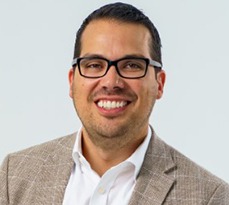
James Goodnow believes that the legal industry is loath to change, and he’s determined to overcome such resistance. The Harvard Law School graduate, who is President and CEO of the US law firm Fennemore, is co-author of the book Motivating Millennials and a prolific columnist on the Above the Law website – where he writes about topics ranging from “How to run your practice like a tech CEO” to “Biglaw still isn’t getting it”.
Convinced that law firms need more entrepreneurial skills, he enrolled in 2020 in the Master of Studies in Entrepreneurship (MSt in Entrepreneurship) degree programme at Cambridge Judge Business School, and says the programme’s lessons have already been incorporated into everyday practice at his 350-person firm, which has 10 offices in Arizona (where James lives), California, Nevada, and Colorado.
James shares some of his thoughts on the legal profession, his Cambridge Judge programme, and study dates with his wife:
You’d be hard-pressed to find an industry that resists change more than the legal profession. In the US, the entire legal system is built on precedent – literally looking backward to determine how to proceed forward. That backward-looking mindset permeates all aspects of the profession, but it’s especially powerful in law firms around the globe.
Law firms that don’t evolve face existential risks, which have increased with the pandemic. With every passing day, legal startups, consulting firms, and technology companies are taking market share from law firms by creating more efficient solutions. If law firms don’t take innovation and entrepreneurship seriously and start acting immediately, they will pay a high price – or go out of business.
As a law firm leader, I have to equip myself with the tools to help our firm succeed in a landscape that’s changing at breakneck speed. I decided that what I needed most is a sustained focus on innovation, technology, and forging a new course through intrapreneurship and entrepreneurial leadership. I discovered the Cambridge Judge entrepreneurship programme, which is a perfect fit for my needs.
Due to the pandemic, our 135-year old law firm began functioning much like a startup. The tried-and-true playbook our firm had followed for decades was thrown out the window. Every aspect of the business and our model was tested. The demands the situation placed on our leadership team on a daily basis were extraordinary. I put the knowledge I gained at the Business School into practice immediately. In the evening I learned about strategy, systems, and organisational behaviour in a fast-moving entrepreneurial setting through the programme. The next morning, I‘d wake up and apply those lessons in real life at the firm as we reformulated every aspect of our business model. The programme has been a perfect combination of theory and practice that’s been invaluable to navigating countless massively complex issues that have arisen because of the pandemic.
The perspectives of my classmates have been a tremendous asset. My class includes graduates of some of the world’s top MBA and business school programmes, physicians, and seasoned entrepreneurs – and I’ve learned a great deal from each of them. Because of the pandemic, I wasn’t able to travel to Cambridge for the first residential session, but the programme’s leaders did a stellar job of making it work remotely. While my classmates were in the lecture halls in the UK, those of us participating remotely felt like we were in the classroom. Our faces were on big screens right next to the members of our cohort and the professors. We were able to ask questions, participate in conversations, and be part of the action – just like we were there in person.
Not everybody gets to do study dates with their spouse. My wife, Erin Goodnow, is also enrolled in the MSt in Entrepreneurship programme at Cambridge Judge Business School. She’s a successful entrepreneur who runs Going Ivy, a leading US college admissions consulting business. Life is busy with 2 demanding full-time jobs and 2 young kids, so we have to get creative when it comes to doing our coursework. The study date concept works like this: after the kids go to bed, we cook dinner, play some tunes, pour a drink, and plop our laptops on the kitchen island. We’ll work through the modules, ask each other questions about readings, review concepts – and periodically stop in between to talk about the day, the kids, or what’s happening in life. It’s a fun way for us to get our academic work done and still have time together.
We’ve woven Cambridge Judge Business School into our busy lives to make it work. Our children, ages 7 and 8, are obsessed with the Harry Potter series. We’ve told them that Cambridge is a bit like Hogwarts for adults, which has made them excited to learn more about it. On the weekends, we’ve had family learning time where we convert the dining room into our in-home study hall. While our kids review arithmetic and reading, Erin and I review the coefficient of variation, cash flow statements, and finance theories – and all the while our little dog Luna rests at our feet to be part of the family activity.


